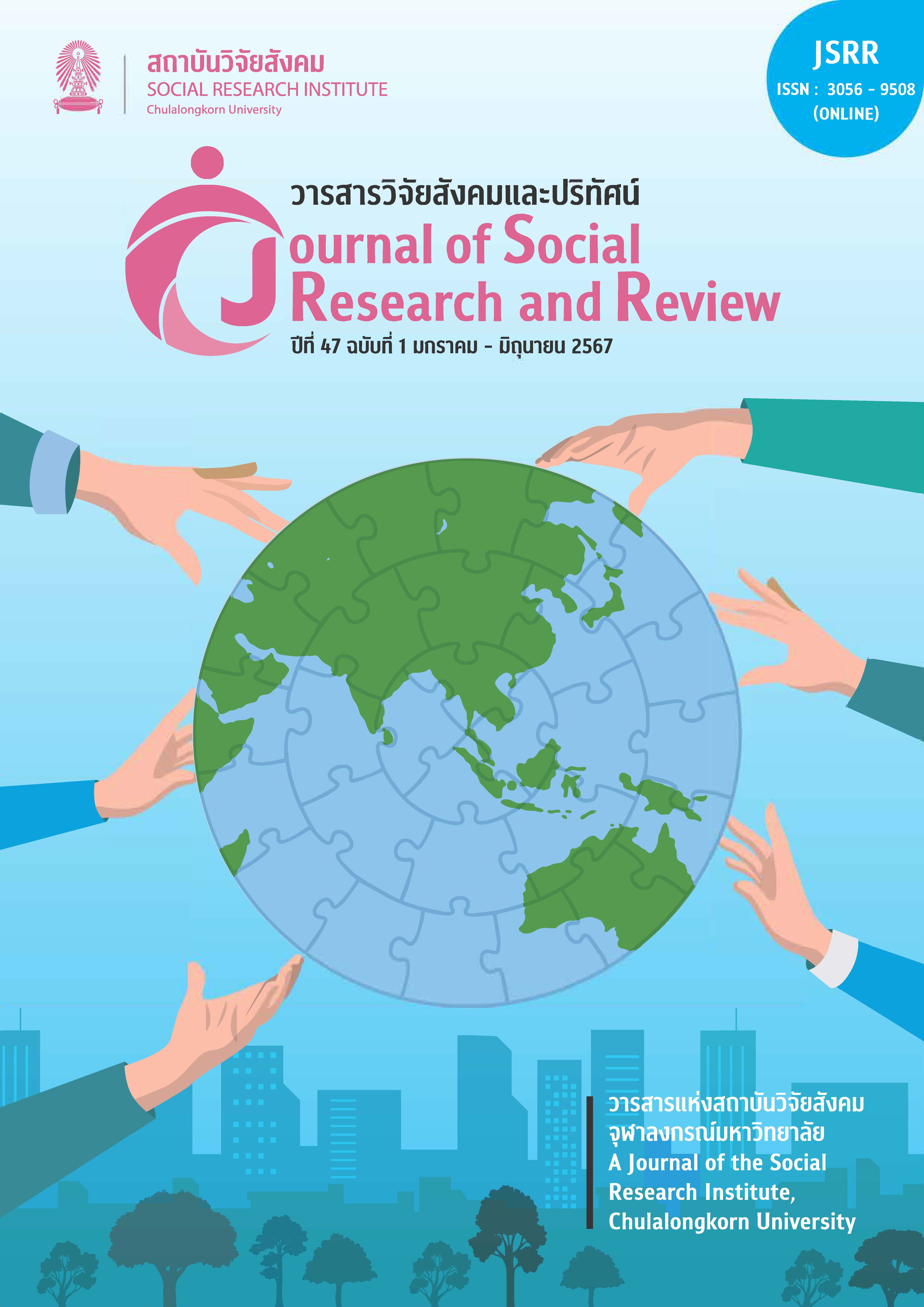วิจัยปฏิบัติการแบบมีส่วนร่วมเชิงวิพากษ์: การเสริมพลังของชุมชนเพื่อการเปลี่ยนแปลงทางสังคม
Main Article Content
บทคัดย่อ
การวิจัยปฏิบัติการแบบมีส่วนร่วมเชิงวิพากษ์ (Critical participatory action research: CPAR) เป็นวิธีวิทยาการวิจัยที่เน้นการเสริมพลังของชุมชนเพื่อการเปลี่ยนแปลงทางสังคม ผ่านการมีส่วนร่วมกับชุมชนในการหาทางออกของปัญหาสังคม โดยบูรณาการแนวคิดเชิงวิพากษ์สังคมและหลักการการวิจัยปฏิบัติการแบบมีส่วนร่วม (PAR) ที่นำไปสู่การปลดปล่อย (Emancipation) ซึ่งชุมชนมีบทบาทสำคัญในกระบวนการวิจัยและการแก้ปัญหาทางสังคม โดยการร่วมกันในการระบุและวิเคราะห์ประเด็นสังคมของชุมชนและดำเนินการหาทางออกของปัญหา
แนวทางการปฏิบัติของการวิจัยแบบ CPAR คือ การทำงานร่วมกัน การตัดสินใจแบบประชาธิปไตย มีเป้าหมายเพื่อการเปลี่ยนแปลงร่วมกัน และการสะท้อนย้อนคิดการทำงานร่วมกัน แสดงให้เห็นว่าวิธีวิทยาการวิจัยแบบ CPAR เน้นการมอบอำนาจให้ชุมชนเป็นศูนย์กลางของกระบวนการวิจัยเชื่อว่าสังคมเปลี่ยนแปลงด้วยพลังการมีส่วนร่วมของชุมชนกันเอง และตระหนักต่อความยุติธรรมทางสังคม โดยบทบาทนักวิจัย เป็นผู้อำนวยความสะดวก (Facilitator) เพื่อส่งเสริมและสนับสนุนให้ผู้มีส่วนได้ส่วนเสียในการวิจัยมีส่วนร่วมอย่างเต็มที่ โดยการสร้างพื้นที่การมีส่วนร่วมจากความรู้สึกเชื่อมั่นในกระบวนการวิจัยที่มีเป้าหมายสู่การเปลี่ยนแปลงที่เป็นรูปธรรม
Article Details

อนุญาตภายใต้เงื่อนไข Creative Commons Attribution-NonCommercial-NoDerivatives 4.0 International License.
1) บทความนี้เป็นลิขสิทธิ์ของสถาบันวิจัยสังคม จุฬาลงกรณ์มหาวิทยาลัย แต่ความคิดเห็นและเนื้อหาเป็นของผู้แต่ง
2) ทัศนะและความคิดเห็นที่ปรากฏในบทความในวารสารวิจัยสังคมและปริทัศน์ สถาบันวิจัยสังคม จุฬาลงกรณ์มหาวิทยาลัย ถือเป็นความรับผิดชอบของผู้แต่งบทความนั้น และไม่ถือเป็นทัศนะและความรับผิดชอบของกองบรรณาธิการวารสารวิจัยสังคมและปริทัศน์ สถาบันวิจัยสังคม จุฬาลงกรณ์มหาวิทยาลัย กองบรรณาธิการไม่สงวนสิทธิ์ในการคัดลอก แต่ให้ระบุถึงการอ้างอิง
เอกสารอ้างอิง
เก ประเสริฐสังข์, ดุษฎี โยเหลา และสมไทย วงษ์เจริญ. (2561). การวิจัยปฏิบัติการเชิงวิพากษ์เพื่อสร้างรูปแบบและกลไกการจัดการขยะอย่างครบวงจรบนฐานการมีส่วนร่วมของโรงเรียนและชุมชน. วารสารพฤติกรรมศาสตร์, 24(2), 65-80.
ทศพล วัฒนานุกูลวงศ์. (2566). การวิจัยปฏิบัติการแบบมีส่วนร่วมเชิงวิพากษ์เพื่อสร้างสรรค์อัตลักษณ์นักกิจกรรมการอนุรักษ์สิ่งแวดล้อมอย่างยั่งยืนในสถาบันอุดมศึกษา. [วิทยานิพนธ์ปริญญาดุษฎีบัณฑิต]. มหาวิทยาลัยศรีนครินทรวิโรฒ.
ทศพล วัฒนานุกูลวงศ์, สุเมษย์ หนกหลัง และกิตติกร สันคติประภา. (2566). การพัฒนาสู่ความทันสมัยที่มีอิทธิพลต่อการจัดกิจกรรมอนุรักษ์สิ่งแวดล้อมในสถาบันอุดมศึกษา. วารสารวิจัยวิชาการ, 6(4), 359-376.
วรรณดี สุทธินรากร. (2556). การวิจัยเชิงปฏิบัติการ: การวิจัยเพื่อเสรีภาพและการสรรค์สร้าง. สำนักพิมพ์สยามปริทัศน์.
สุเมษย์ หนกหลัง. (2560). การพัฒนาการถ่ายทอดภูมิปัญญาท้องถิ่นเรื่องป่าชายเลนชุมชนผ่านการมีส่วนร่วมของชุมชนให้แก่เยาวชนในชุมชนเกาะหยงสตาร์ จังหวัดตรัง. วารสารสถาบันวัฒนธรรมและศิลปะ มหาวิทยาลัยศรีนครินทรวิโรฒ, 18(2), 115-123.
สุเมษย์ หนกหลัง. (2562). การวิจัยปฏิบัติการแบบมีส่วนร่วมเพื่อการจัดการความรู้ภูมิปัญญาท้องถิ่น เรื่อง การใช้ประโยชน์จากต้นจากในชุมชนเกาะหยงสตาร์ จังหวัดตรัง. วารสารด้านการบริหารรัฐกิจและการเมือง, 7(1), 179-208.
Bergold, J., & Thomas, S. (2012). Participatory research methods: A methodological approach in motion. Historical Social Research/Historische Sozialforschung. 37(4), 191-222.
Chen, S. H. (2017). Who cares: Stakeholder participation and the use of performance information in strategic planning. Chinese Public Administration, 8(2), 86-103.
Cotter, G (2023). All Aboard: Charting a community-linked course in development education. Policy and Practice: A Development Education Review, 37(Autumn), 72-89.
Esteban-Guitart, M., Monreal-Bosch, P., Palma, M., & González-Ceballos, I. (2020). Sustaining Students’ Identities within the Context of Participatory Culture. Designing, Implementing and Evaluating an Interactive Learning Activity. Sustainability, 12(12), 4870.
Fletcher, A. J., MacPhee, M., & Dickson, G. (2015). Doing participatory action research in a multicase study: A methodological example. International Journal of Qualitative Methods, 14(5), 1-9.
Freire, P. (2020). Pedagogy of the oppressed. In Toward a sociology of education. (pp. 374-386). Routledge.
Gill, H., Purru K. & Lin G. (2012). In the midst of participatory action research practices: Moving towards decolonizing and decolonial praxis. Reconceptualizing Educational Research Methodology 2012, 3(1). 1-15.
Gray, S., Jordan, R., Crall, A., & Newman, G. (2017). Combining participatory modelling and citizen science to support volunteer conservation action. Biological conservation, 208, 76-86.
Hall, S., & Back, L. (2014). At home and not at home. In Stuart Hall and ‘Race’. (pp. 202-231). Routledge.
Hergenrather, K. C., Rhodes, S. D., Cowan, C. A., Bardhoshi, G., & Pula, S. (2009). Photovoice as community-based participatory research: A qualitative review. American Journal of Health Behavior, 33(6), 686-698.
Kemmis, S. (2006). Participatory action research and the public sphere. Educational Action Research, 14(4), 459-476.
Kemmis, S., McTaggart, R., & Nixon, R. (2014). Introduction critical participatory action research. In The action research planner: Doing critical participatory action research. (pp. 1-31) Springer.
Kimberly, R. (2019). Exploring the Implications of White Teacher Identity in a Critical Participatory Action Research Study. [Doctoral dissertation Department Undergraduate Studies in Education]. Brock University.
McTaggart, R., Nixon, R., Kemmis, S. (2017). Critical Participatory Action Research. The Palgrave International Handbook of Action Research, 21-35.
Minkler, M., & Wallerstein, N. (2011). Community-based participatory research for health: From process to outcomes: John Wiley & Sons.
Morrell, E. (2006). Critical participatory action research and the literacy achievement of ethnic minority groups. In J. Hoffman, D. Schallert, C. Fairbanks, J. Worthy, & B. Maloch (Eds.), 55th Annual Yearbook of the National Reading Conference (pp. 54–55). Oak Creek, WI: National Reading Conference.
Noklang, S. (2020). The development of self-directed learning skills of teacher candidates through community-based recreation program. Participatory Educational Research, 7(3), 217-229.
Noklang, S., Prakongpan, P., Meepan, W., Dechawatsinsiri, N., Niyomdecha, A., & Hernandez, V. (2023). Critical Participatory Action Research for Development of Private School Teachers' Work Approaches in Bangkok. Journal of Research and Curriculum Development, 13(2), 39-52.
Sadık, O. (2019). Critical participatory action research: A design to empower women in a teacher education institution. International Journal of Research in Teacher Education, 10(2), 20–27.
Sallah, M. (2014). Participatory Action Research with ‘Minority Communities’ and the Complexities of Emancipatory Tensions: intersectionality and cultural affinity. Research in Comparative and International Education, 9(4), 402-411.
Thinyane, M., Bhat, K., Goldkind, L., & Cannanure, V. K. (2018, August). Critical participatory design: reflections on engagement and empowerment. In a case of a community based organization. In Proceedings of the 15th Participatory Design Conference: Full Papers-Volume 1. (pp. 1-10).
Wallerstein N, Muhammad M, Sanchez-Youngman S, et al. (2019). Power dynamics in community-based participatory research: A multiple–case study analysis of partnering contexts, histories, and practices. Health Education & Behavior, 46(1), 19-32.
Zuber-Skerritt, O. (2015). Participatory action learning and action research (PALAR) for community engagement: A theoretical framework. Educational Research for Social Change, 4(1), 5-25.


